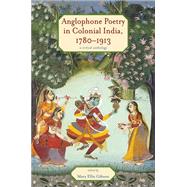Anglophone Poetry in Colonial India, 1780-1913
, by Gibson, Mary Ellis- ISBN: 9780821419427 | 0821419420
- Cover: Hardcover
- Copyright: 8/15/2011
Anglophone Poetry in Colonial India, 17801913: A Critical Anthologymakes accessible for the first time the entire range of poems written in English on the subcontinent from their beginnings in 1780 to the watershed moment in 1913 when Rabindranath Tagore won the Nobel Prize in Literature. Mary Ellis Gibsonestablishes accurate texts for such well-known poets as Toru Dutt and the early Indian English poet Kasiprasad Ghose. The anthology brings together poets who were in fact colleagues, competitors, and influences on each other. The historical scope of the anthology, beginning with the famous Orientalist Sir William Jones and the anonymous "Anna Maria" and ending with Indian poets publishing in fin-de-siegrave;cle London, will enable teachers and students to understand what brought Kipling early fame and why at the same time Tagorers"s Gitanjali became a global phenomenon.Anglophone Poetry in Colonial India, 17801913puts all parties to the poetic conversation back together and makes their work accessible to American audiences. With accurate and reliable texts, detailed notes on vocabulary, historical and cultural references, and biographical introductions to more than thirty poets, this collection will significantly reshape the understanding of English language literary culture in India. It allows scholars to experience the diversity of poetic forms created in this period and to understand the complex religious, cultural, political, and gendered divides that shaped them.






